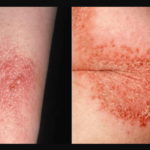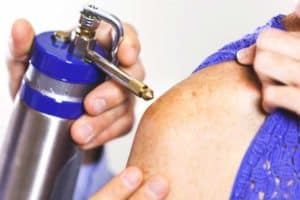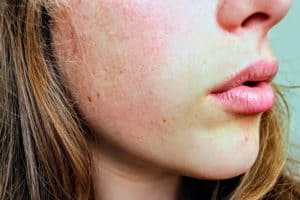A rash and prickly skin often accompany each other; however, sometimes, the skin feels prickly without a rash. What are the possible causes when your skin feels prickly but no rash appears?
9 possible causes of your skin feeling prickly without a rash are as follows:
- Medication Side Effects
- Dry Skin
- Neural Disorders
- Diabetes mellitus
- Skin Cancer
- Hodgkin Lymphoma
- Liver Disease
- Menopause
- Insect Bites
Some of the above conditions are not due to illnesses but are only temporary, and you can remedy them quickly by changing your skin habits. For example, dry skin, insect bites, and medication side effects can be relatively simple to fix.
The rest of the causes are the effects of existing conditions in the body, which can be severe and require medication.
Read on to learn more about why your skin feels prickly but no rash appears; and how you can solve this issue.
Skin Feels Prickly but No Rash
There are several causes why your skin can feel prickly, even without a rash appearing.
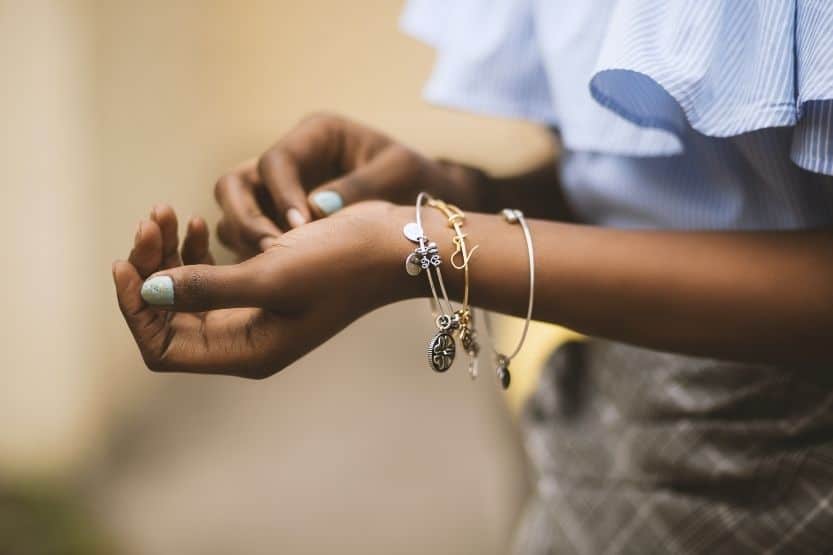
Let’s go into the details of each of these causes, and learn about the treatment and prevention procedures:
1. Medication Side Effects
One of the side effects of some therapeutic drugs is prickly skin in susceptible individuals. Examples of these medications are some anti-hypertensive drugs and analgesics. The prickly skin as a medication side effect can occur with or without rashes.
Treatment
When the prickly skin is persistent, you could consult a skin specialist. This way, you’ll be sure of the root cause. Doctors can determine this through physical examination and diagnostic tests. Doctors may also request a list of your medications to determine if they are causing the symptom.
Once doctors have established the cause, they may prescribe diphenhydramine to reduce itchiness. Alternatively, they can request further tests to determine if the cause is metabolic.
When the medication is the reason, doctors will change the therapeutic drug to the one you are not allergic to or sensitive to.
Prevention
Inform your doctor of any allergies before taking your prescribed drugs. As soon as your skin feels prickly, consult your doctor immediately. This symptom may be an allergic reaction and could be fatal.
You could go into anaphylactic shock if the allergy turns severe. Thus, don’t wait for the condition to worsen.
2. Dry Skin
Many people have dry skin, and this can cause irritations, such as prickly or scaly skin. Dryness of the skin can be painful aside from being prickly. If you don’t treat it early on, it can exacerbate and lead to more severe symptoms.
Treatment
Most doctors would treat dry skin by prescribing medications for itchy skin, such as Lac-Hydrin and salicylic acid. They also recommend the use of skin moisturizers, such as Cetaphil. You may want to use baby oil to maintain your skin’s oil to treat drying skin.
Prevention
You can prevent dry skin by hydrating yourself properly. You can also use skin moisturizers twice a day and every after taking a bath. Water is transported to the skin cells to hydrate them and prevent skin dryness adequately.
Moisturizers can act on skin cells to supply moisture and promote smooth and healthy skin.
3. Neural Disorders
Some nerve disorders, such as nerve damage, can cause itchy or prickly skin. The site of itchiness would depend on the injured nerve’s location. Besides prickly skin, you will know if you have an injured nerve if you feel sudden jerky movements and numbness in some parts of your body.
Treatment
You should consult a neurologist in cases like these so that that appropriate diagnostic treatment can start.
Prevention
Ensure your safety when performing any task to prevent accidents or mishaps. Wear protective gear if necessary, and undertake measures to ascertain that your working environment is safe.
4. Diabetes Mellitus
Diabetes mellitus is the insufficiency of insulin in the body. Insulin is responsible for lowering the levels of blood sugar. This insufficiency affects many organs in the body, including nerve endings, especially the peripheral nerve endings (body extremities).
Diabetic neuropathy can cause itchiness or prickly skin. Aside from itching or prickling skin, other symptoms of diabetes on the skin include the following:
- Fungal infections,
- Styles,
- Diabetic dermopathy,
- Boils,
- Blisters, and
- Carbuncles. [1]
General symptoms include the following:
- Hyperglycemia (elevated blood sugars),
- Glycosuria (sugar in urine);
- Polydipsia (excessive thirst);
- Polyphagia (excessive hunger); and
- Polyuria (increased urination), among others.
Treatment
Keep your skin dry and clean. You can use moisturizers to prevent dryness. When washing, don’t use too cold or too hot water. You also have to consult a physician to treat diabetes first. There is no use in treating prickly skin symptoms if the primary cause is not managed correctly.
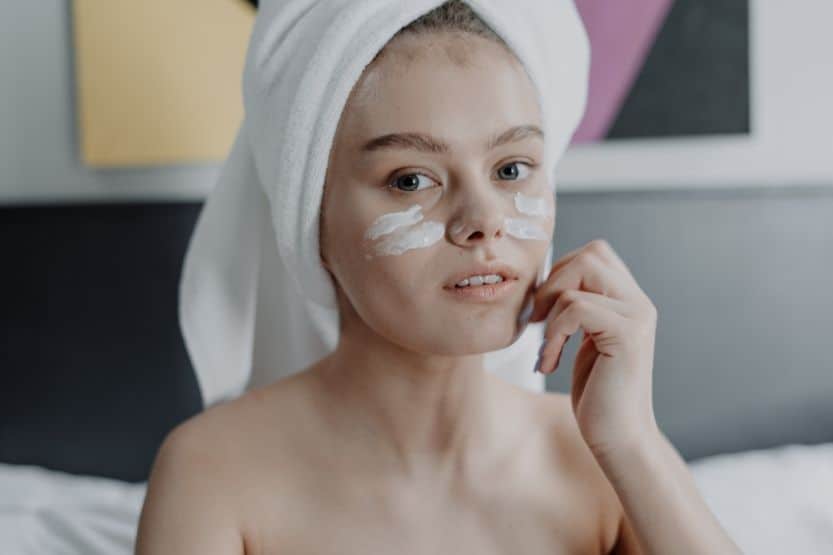
At present, there is no treatment for diabetes, but you can manage the condition to maintain normal sugar concentrations through medication (diamicron, metformin, or insulin.) Consult your doctor for a suitable dose and therapeutic drug for your diabetes.
Prevention
You can inherit the genes of your diabetic parent that can increase your risk of acquiring the condition. However, you can prevent its progress by eating a low sugar and carbohydrate diet, exercising, and avoiding sweetened foods.
5. Skin Cancer
One of the early signs of skin cancer is prickly or itchy skin. The itchy area may develop into a lesion. Other skin symptoms include unusual skin changes and moles.
Treatment
You will have to consult a skin specialist to determine if the prickly skin is due to skin cancer. The doctor may request a skin biopsy or a microscopic examination of your skin cells.
She may also order Complete Blood Count (CBC), blood morphology, and other necessary tests to determine if the cause is skin cancer.
When the doctor confirms the cancer diagnosis, appropriate drug treatment will commence. Chemotherapy is also one method of treatment. Experts can successfully treat skin cancer if it is in the early stages, such as stage 1. But once cancer reaches stage 4, the prognosis is bad.
Prevention
It would be best if you protect yourself from the radiation coming from the harmful sun rays. These are the sun’s ultraviolet rays from 10 a.m. to 4 p.m.
Wear a hat, or adequate cover, like an umbrella when going out between these times. Early morning sunshine is healthy, though, so expose yourself to the sun from 7 to 10 a.m.
6. Hodgkin Lymphoma
This is a curable illness, and some of its symptoms include itchy skin (prickly skin), weight loss, fever, chills, night sweats, and swelling lymph nodes. The specific cause of Hodgkin is still not established, but experts believe that it is because of genetic and DNA malfunction.
The physician can diagnose the disease through biopsies, blood tests, and physical exams.
Treatment
The treatment for prickly skin is personal hygiene, and in extreme cases, medication for itchiness. You will not get rid of the itchiness unless the existing disease is treated. Treatment for Hodgkin lymphoma is chemotherapy or radiation therapy.
Prevention
You have to quit smoking as this increases your risk of acquiring the disease. You must also maintain a healthy lifestyle to strengthen your immune system and reduce Hodgkin lymphoma’s risk.
7. Liver Disease
The liver is the major metabolic organ of the body. It is responsible for detoxifying the body by converting harmful substances to their less harmful forms. The liver also is where the metabolism and catabolism of food occur with the help of enzymes.
In liver diseases (hepatitis and cirrhosis), the liver becomes dysfunctional, disrupting its biochemical functions. One of these symptoms is itchy skin, especially in the soles area and the palm of the hands. The prickly skin becomes worst during nighttime and warm weather.
Treatment
Doctors treat prickly skin by recommending skincare and cleanliness. They may subscribe to medications to ease the itchiness.
But they would also find out the genuine cause of the symptom; hence, they will perform laboratory tests to diagnose correctly. The liver disease diagnosis will prompt them to cure the primary condition to treat your prickly skin permanently.
They may prescribe cholestyramine, essentiale, or amoxicillin for infections. The prescription would depend on the specific liver condition you have.
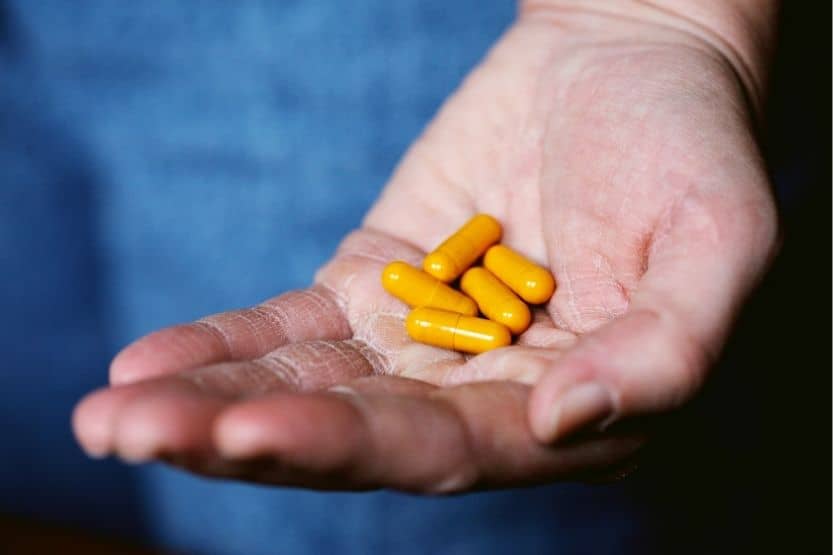
Prevention
You would also be required to modify your lifestyle and avoid fatty foods and alcohol to prevent liver diseases.
8. Menopause
Some women undergoing menopause complain of prickly skin. This condition occurs due to a hormonal imbalance that occurs during menopause. Menopausal women also complain of mood swings, hot flashes, irritability, and many more symptoms.
Treatment
Doctors recommend hormonal therapy or estrogen therapy. Estrogen is given in the shortest time frame and the lowest dose to relieve prickly heat or hot flashes.
You can apply ice compress on prickly skin areas to relieve itchiness. Your doctor may also prescribe oral medication (Benadryl) or topical ointments (Caladryl) to ease prickly skin.
Prevention
You cannot prevent menopause in women as this is the natural course of a woman’s reproductive organs. But you can definitely ease the symptoms by adopting a healthy lifestyle so that the effects will not be as intense as they should be.
Make it a habit to exercise, eat healthy food, sleep well, and hydrate yourself appropriately.
9. Insect Bites
Insect bites can cause prickly skin. This symptom may be coupled with inflammation or bumps. Examples of insect bites are mosquito or bedbug bites.
Treatment
You may want to try some home remedies for insect bites, such as crushed ice, honey, and baking soda. You can directly apply the honey and baking soda to the insect bite.
As for the crushed ice, use an ice bag and apply it every after 2 minutes to avoid damaging the skin. Ice packs would help reduce itchiness and pain too.
When the bite is infected, you will have to consult a doctor. He/she may recommend topical ointments, such as hydrocortisone cream. The doctor may prescribe antibiotics for the infection.
Prevention
Clean your environment to prevent harboring insects. You should place plants in suitable places to prevent bugs from crawling into your bedroom. In areas where bugs are plenty, wear protective clothing to keep your skin covered.
Skin feels prickly but no rash appears? The most common cause of prickly skin without a rash is dry skin. The prickly skin could also be caused by an insect bite or medication side effects. More serious causes of prickly skin can be diabetes or liver disease.
Next, let’s discuss some home remedies and tips on dealing with prickly heat.
Home Remedies for Prickly Skin with No Rash
Several home remedies can be used to treat the feeling of prickly skin. The most common and effective natural home remedies are as follows:
- Ice pack
- Baking soda
- Basil
- Aloe Vera
- Honey
- Lemon balm
You can apply concentrated, chopped, or water diluted portions of these substances directly to the prickly area.
Tips for Managing and Preventing Skin That Feels Prickly
1. Maintain Skin Cleanliness
Take care of your skin. Adopt appropriate measures to maintain its cleanliness, smoothness, and health. Prickly skin can also result from dirty skin and skin dryness.
2. Avoid Scratching
Avoid scratching the area vigorously as you can injure your skin. If your skin is too itchy, pat it with your fingers. You could apply oil or moisturizers to ease the itchiness and dryness.
3. Conduct a Health Evaluation Every Year
You may want to keep a tab of your health every year to prevent the occurrence of the underlying diseases that can cause prickly skin. It’s best to ensure that you are healthy.
4. Consult a Specialist
Be ready to consult a specialist when you still feel your skin is prickly. As you can notice from the causes mentioned above, most of them are diseases that need treatment. Hence, if you experience prickly heat that doesn’t go away, go to your doctor.
Conclusion – Skin Feels Prickly Without a Rash
9 possible causes of your skin feeling prickly without a rash are as follows:
- Medication Side Effects
- Dry Skin
- Neural Disorders
- Diabetes mellitus
- Skin Cancer
- Hodgkin Lymphoma
- Liver Disease
- Menopause
- Insect Bites
A health specialist or doctor can diagnose pathological diseases that can cause prickly skin. It is always a great idea to see a doctor who will help determine your condition’s root cause.
Take note of the possible treatments and preventions of this skin issue so that you can stop getting prickly skin permanently.
Related reading:
I Feel Like Bugs Are Crawling on Me but Nothing Is There
Feels Like Something Is Biting Me but Nothing Is There
Needle Pricking Sensation on Skin Surface


![Bleeding Pore on Nose [11 Possible Causes and Treatments] bleeding pore on nose](https://skincaregeeks.com/wp-content/uploads/2021/04/bleeding-pore-on-nose-150x150.jpg)
![Bruise Itches [Causes and Treatments for an Itchy Bruise] bruise itches](https://skincaregeeks.com/wp-content/uploads/2021/04/bruise-itches-150x150.jpg)
![Neutral Skin Tone Defined [and Best Colors for Neutral Skin] neutral skin tone](https://skincaregeeks.com/wp-content/uploads/2021/05/neutral-skin-tone-150x150.png)

